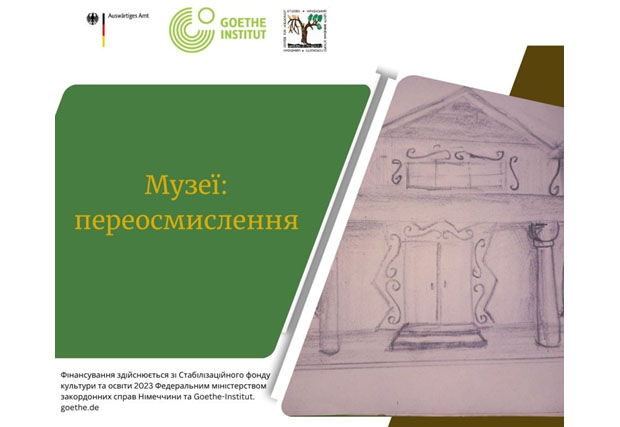Post-project meeting of the Museums: Rethinking
 At the end of 2023, UCHS, with the support of the Stabilisation Fund for Culture and Education 2023 of the German Federal Foreign Office and the Goethe-Institut, completed the project Museums: Rethinking. The project was aimed to support local Ukrainian museums and cultural institutions, encourage their networking and communication with each other, and brought together participants from 16 cultural institutions from all over the country.
At the end of 2023, UCHS, with the support of the Stabilisation Fund for Culture and Education 2023 of the German Federal Foreign Office and the Goethe-Institut, completed the project Museums: Rethinking. The project was aimed to support local Ukrainian museums and cultural institutions, encourage their networking and communication with each other, and brought together participants from 16 cultural institutions from all over the country.
Together, we searched for ways to help cultural institutions rethink or create their own exhibitions or cultural events to highlight the history of the Holocaust and World War II in the context of russia's full-scale war against Ukraine. And we succeeded.
A few months after the official end of the project, we decided to gather the participants online once again to share our achievements, assess the impact of the project on our own institutions and their visitors, talk about future plans and new ideas that have arisen as a result of participating in the project, and think of new ways of cooperation and mutual assistance.
It is important to note that some time after the project was completed, the participants highly appreciated the opportunities they had received. Despite the tight deadlines and very intensive work, the project, according to colleagues, started a long journey of change in their cultural institutions: one idea led to others, they managed to test new approaches to creating exhibitions, attract new visitors and even co-authors of tours, and implement new formats of communication with the audience. The project has left behind solid results and numerous prospects. The main thing is that as a result of active cooperation and mutual visits, we managed to build a close team and establish a tradition of mutual support that will continue in the future.
Announcements
MoreLatest News
-
Research and methodological seminar for educators in Lviv
On 15-16 June, we met with more than twenty participants - mostly teachers from Lviv - to discuss the memory of the Holocaust, other cases of genocide on Ukrainian territory, and the current challenges of working with these topics.
[More] -
History of genocides in Ukraine: studying the experience and challenges of the present. Seminar in Kyiv
On 12-13 June, a research and methodological French-Ukrainian seminar History of genocides in Ukraine: studying the experience and challenges of the present was held in Kyiv. It was organised by the Shoah Memorial (Paris) and the Ukrainian Centre for Holocaust Studies (Kyiv) with the support of the Kuras Institute of Political and Ethnic Studies.
[More] -
Educational Materials “Nazi Genocide against Roma in Ukraine, 1941-1944”
The tragic fate of Roma people during WWII still remains largely unknown in Ukraine and generally in Europe. The new educational materials play an important role in returning Roma history and culture into the history and culture of modern Ukraine, unveiling Roma cultural heritage and the tragic events of WWII genocide against them.
[More] -
(No) Children’s Stories Exhibition returned to Chernivtsi
In May-June 2024, Chernivtsi once again invited the interactive exhibition (No) Children’s Stories. This time, it was hosted by Chernivtsi Gymnasium No. 17, and initiated by history and law teacher Varvara Bodnariuk. The students of 7-9 grades volunteered to host the exhibition and during the month of the event, they gave tours to more than 400 people, including students from their school, other schools in the city, and even the mayor of Chernivtsi and a foreign delegation from Dusseldorf (Germany) with the mayor of the city.
[More] -
Learning From The Past - Acting For The Future seminar
On 18-19 May, the seminar Learning from the Past - Acting for the Future was held in Kyiv. It was a joint event of The Olga Lengyel Institute, New York, and the Ukrainian Center for Holocaust Studies, funded by the Olga Lengyel Institute for Holocaust Studies and Human Rights.
[More]




